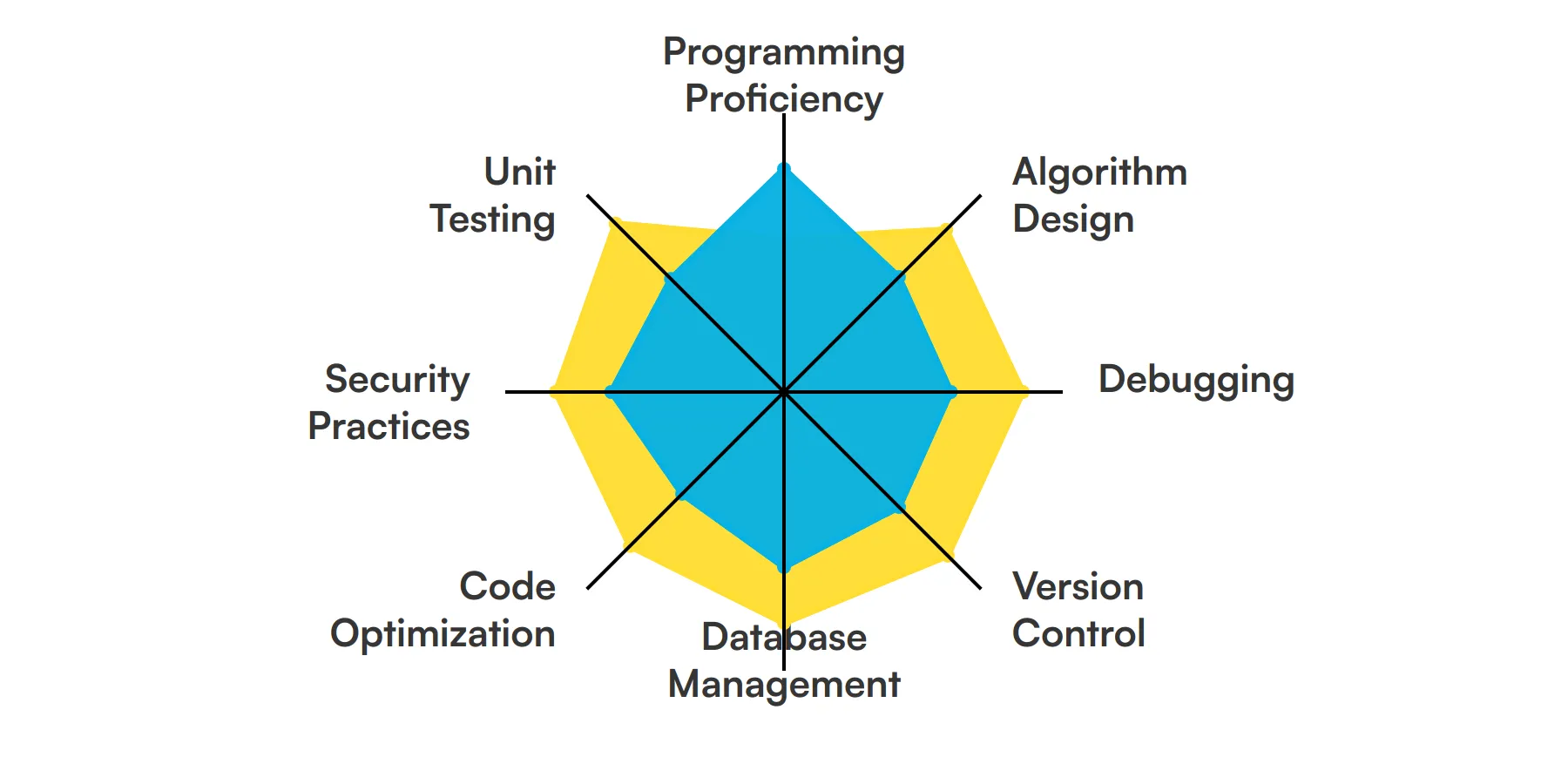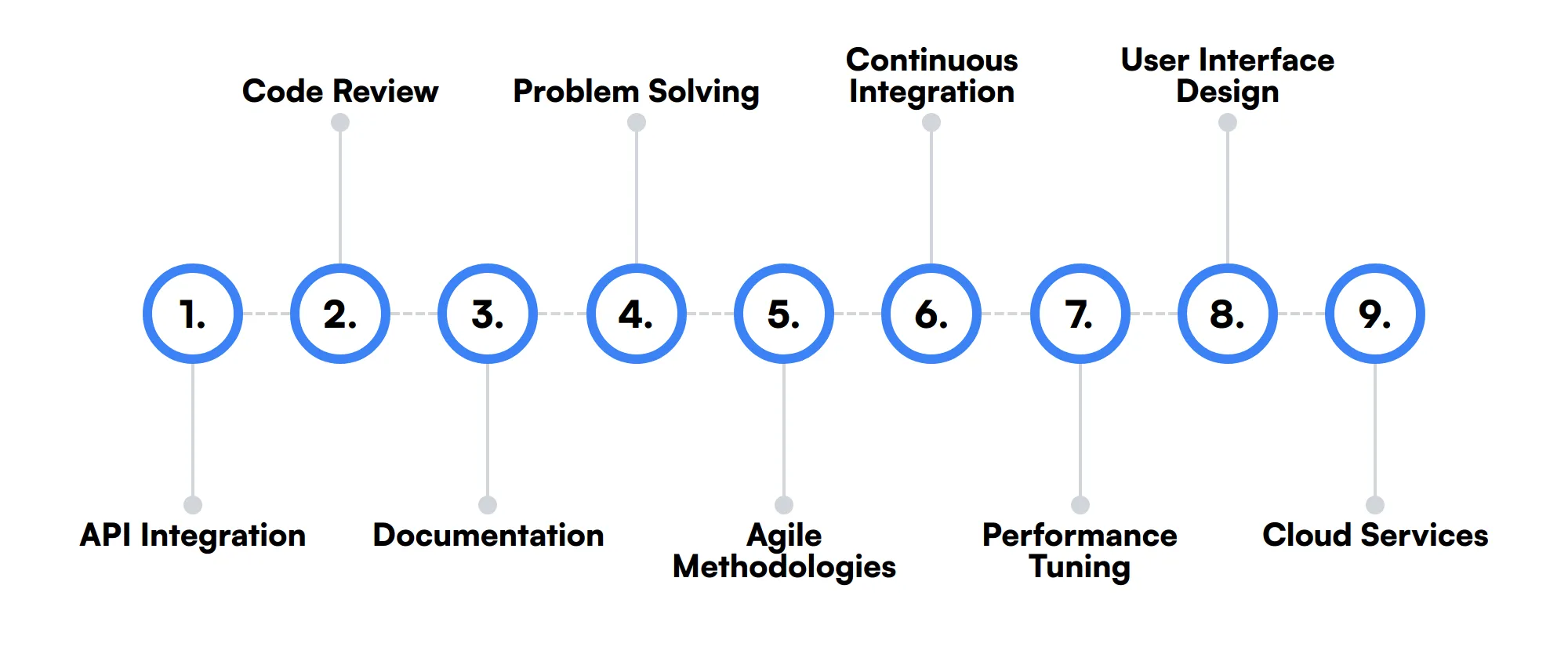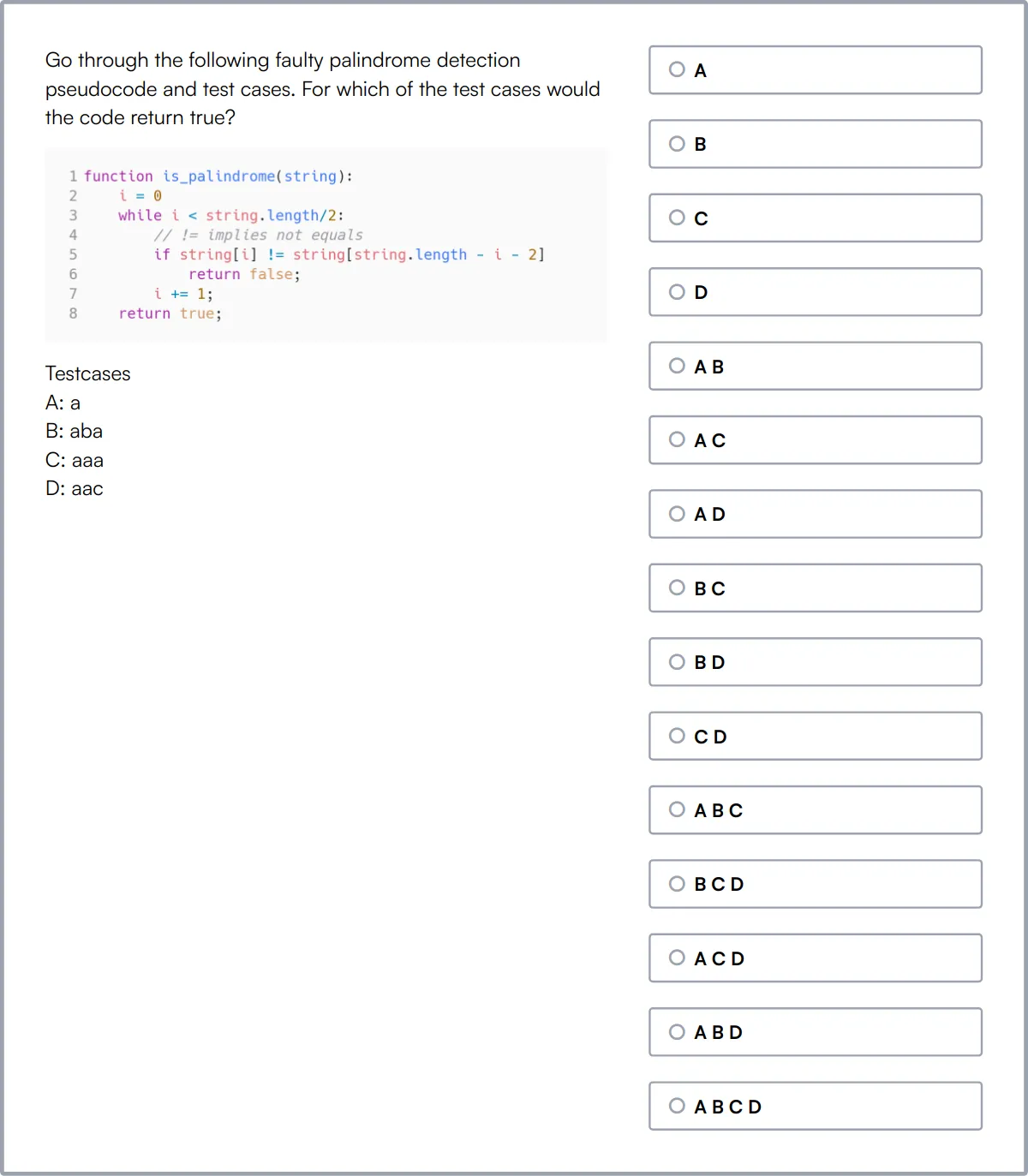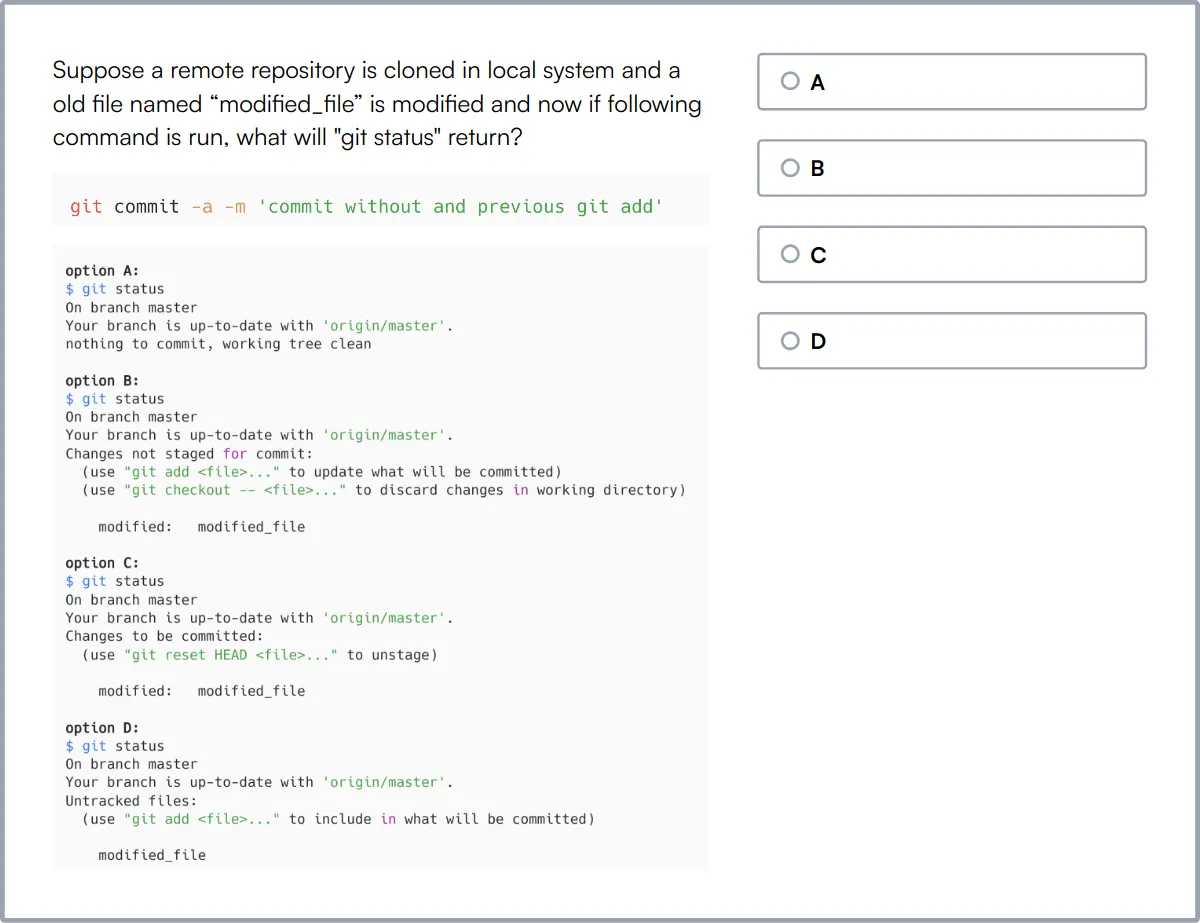The role of a programmer is central to developing software and applications that meet user needs and business requirements. They are the architects behind the code that powers our digital world, from simple apps to complex operating systems.
Programming skills encompass a range of competencies including proficiency in various programming languages like Python, Java, and C++, as well as critical thinking and effective problem-solving abilities.
Candidates can write these abilities in their resumes, but you can’t verify them without on-the-job Programmer skill tests.
In this post, we will explore 8 essential Programmer skills, 9 secondary skills and how to assess them so you can make informed hiring decisions.
Table of contents
8 fundamental Programmer skills and traits
The best skills for Programmers include Programming Proficiency, Algorithm Design, Debugging, Version Control, Database Management, Code Optimization, Security Practices and Unit Testing.
Let’s dive into the details by examining the 8 essential skills of a Programmer.

Programming Proficiency
A programmer must be adept in one or more programming languages such as Python, Java, or C++. This skill involves writing, testing, and maintaining code efficiently, which is fundamental for developing software applications and solving problems.
For more insights, check out our guide to writing a Programmer Job Description.
Algorithm Design
Understanding and implementing algorithms is key for a programmer. This skill helps in optimizing solutions and ensuring that the software performs tasks in the most effective way. It involves analyzing data structures and designing techniques to handle complex computational problems.
Debugging
Debugging involves identifying and fixing errors or bugs in software. Programmers use this skill to ensure the software runs smoothly and meets user requirements. It's a continuous process that enhances the functionality and usability of applications.
Check out our guide for a comprehensive list of interview questions.
Version Control
Familiarity with version control systems like Git is essential for managing changes to project codebases. This skill helps programmers collaborate on projects without conflicting changes and keeps a history of all modifications.
Database Management
Programmers often interact with databases, requiring skills in designing, querying, and maintaining databases using SQL or NoSQL based systems. Effective database management ensures data is accessible, secure, and organized.
For more insights, check out our guide to writing a Database Administrator (DBA) Job Description.
Code Optimization
Optimizing code to improve efficiency and performance is a critical skill. This involves refining algorithms, reducing resource consumption, and enhancing the speed of operations, which are crucial for the scalability of applications.
Security Practices
Implementing security measures in programming is necessary to protect data and prevent vulnerabilities. Programmers must understand secure coding practices to safeguard applications from potential threats.
Check out our guide for a comprehensive list of interview questions.
Unit Testing
Writing and maintaining unit tests to check individual components of the software ensures that each part functions correctly. This practice helps in identifying problems early in the development cycle, saving time and resources.
9 secondary Programmer skills and traits
The best skills for Programmers include API Integration, Code Review, Documentation, Problem Solving, Agile Methodologies, Continuous Integration, Performance Tuning, User Interface Design and Cloud Services.
Let’s dive into the details by examining the 9 secondary skills of a Programmer.

API Integration
Integrating various external APIs allows programmers to enhance functionality without creating everything from scratch. This skill involves understanding third-party services and how they can be incorporated into projects effectively.
Code Review
Reviewing code written by peers helps maintain a high standard of code quality and encourages collaborative learning among team members. This process helps in catching errors that might have been overlooked during initial development.
Documentation
Good documentation is key for future maintenance and upgrades. Programmers must be able to write clear, concise, and useful documentation for their code and software architectures.
Problem Solving
The ability to quickly identify problems and devise effective solutions is invaluable. This skill is continuously used to navigate challenges during software development.
Agile Methodologies
Understanding and applying agile methodologies can enhance project flexibility and team productivity. This approach helps programmers adapt to changes quickly and deliver work in manageable increments.
Continuous Integration
Familiarity with continuous integration tools helps in automating the testing and deployment of code. This practice increases development speed and minimizes the risk of errors in the production environment.
Performance Tuning
The ability to fine-tune system performance by assessing and modifying system parameters is crucial for maintaining an efficient runtime environment.
User Interface Design
While not always mandatory, having an eye for user interface design can be beneficial. This skill helps in creating intuitive and user-friendly interfaces that enhance the overall user experience.
Cloud Services
Knowledge of cloud services like AWS, Azure, or Google Cloud can be advantageous. It allows programmers to leverage cloud-based resources and services to enhance application scalability and reliability.
How to assess Programmer skills and traits
Assessing programmer skills and traits can be a challenging task, given the diverse range of abilities required. It's not just about knowing how to code; it's about understanding algorithms, debugging effectively, managing databases, and more. To ensure you find the right fit for your team, you need a comprehensive approach that goes beyond just looking at resumes and certifications.
Traditional hiring methods often fall short in evaluating a candidate's true capabilities. This is where skills-based assessments come into play. They provide a more accurate picture of a programmer's proficiency in key areas such as programming, algorithm design, and code optimization. Adaface assessments are designed to help you achieve 2x improved quality of hires by focusing on real-world skills and reducing screening time by 85%.
Let’s look at how to assess Programmer skills with these 6 talent assessments.
Computer Programmer Coding Aptitude Test
Computer Programmer Coding Aptitude Test evaluates candidates on their ability to solve problems using logic, analytical thinking, and programming concepts. It covers programming fundamentals, data structures, algorithm basics, technical aptitude, and coding.
The test assesses understanding of algorithms, data structures, programming paradigms, syntax, and programming logic. Candidates analyze problems, identify patterns, and develop solutions using programming concepts. They are also evaluated on their proficiency in writing functional code regardless of the specific programming language or framework used.
Successful candidates demonstrate strong problem-solving skills and a solid grasp of programming fundamentals. They can effectively analyze scenarios and apply appropriate programming techniques to develop solutions.

Software Engineering Online Test
Software Engineering Online Test evaluates candidates on core computer science concepts such as object-oriented programming, database design, algorithms, data structures, and software security. It also includes a coding question to assess hands-on programming ability.
The test covers object-oriented programming, database design, algorithms, data structures, testing and quality assurance, web development, software security, and code optimization. Candidates navigate through realistic scenarios to demonstrate their understanding of these topics.
High-scoring candidates show proficiency in designing and optimizing software systems, ensuring security, and implementing effective testing strategies. They also demonstrate strong coding skills and the ability to solve complex problems.
Manual Testing Online Test
Manual Testing Online Test evaluates candidates on their knowledge of manual software testing. It covers testing fundamentals, test case writing, test plan development, test strategy, and various types of testing.
The test assesses proficiency in designing and executing test cases, creating and managing bug reports, and testing different types of software such as web applications, desktop applications, and mobile applications. Candidates are evaluated on their understanding of testing methodologies like black box and white box testing.
Successful candidates demonstrate strong documentation skills and the ability to develop comprehensive test plans and strategies. They are proficient in identifying defects and ensuring software quality through meticulous testing.

Git Online Test
Git Online Test evaluates candidates on their understanding of Git, a popular version control system. It covers Git basics, repository creation, branching and merging, committing changes, and conflict resolution.
The test assesses knowledge of basic and advanced Git commands, resolving conflicts, and managing source code using Git. Candidates demonstrate their ability to work with remote repositories, rebase, and follow Git workflows.
High-scoring candidates show proficiency in using Git to manage code efficiently, resolve conflicts, and implement effective branching models. They understand Git workflows and can handle complex version control scenarios.

MySQL Online Test
MySQL Online Test evaluates candidates on their proficiency in using MySQL. It covers SQL queries, database design, normalization, indexing, transactions, and stored procedures.
The test assesses knowledge of SQL queries, database design, normalization, indexing, data manipulation language, data definition language, views, stored procedures, triggers, and transactions. Candidates demonstrate their ability to work with MySQL databases and use its features to manage and manipulate data.
Successful candidates show strong skills in writing efficient SQL queries, designing normalized databases, and implementing indexing and transactions. They can effectively use MySQL features to manage data and ensure database performance.

Apache Cassandra Online Test
Apache Cassandra Online Test evaluates candidates on their knowledge of Apache Cassandra, a distributed NoSQL database management system. It covers data modeling, CQL, cluster architecture, replication, data consistency, and performance optimization.
The test assesses proficiency in data modeling, Cassandra Query Language (CQL), partitioning and distribution, data replication and consistency, Cassandra architecture and internals, performance tuning and optimization, backup and recovery, and security and authentication. Candidates demonstrate their ability to design, deploy, and manage Cassandra clusters.
High-scoring candidates show strong skills in designing efficient data models, optimizing performance, and ensuring data consistency and security in Cassandra clusters. They understand Cassandra's architecture and can handle complex deployment scenarios.
Summary: The 8 key Programmer skills and how to test for them
| Programmer skill | How to assess them |
|---|---|
| 1. Programming Proficiency | Evaluate a candidate's ability to write clean, effective code. |
| 2. Algorithm Design | Assess understanding and application of data structures and algorithms. |
| 3. Debugging | Test ability to identify and fix software bugs quickly. |
| 4. Version Control | Check proficiency in using tools like Git for code management. |
| 5. Database Management | Determine skills in designing, querying, and maintaining databases. |
| 6. Code Optimization | Review ability to enhance code for better performance and efficiency. |
| 7. Security Practices | Examine knowledge of securing applications against common vulnerabilities. |
| 8. Unit Testing | Evaluate creation and management of automated software tests. |
Computer Programmer Coding Aptitude Test
Programmer skills FAQs
How can I assess a candidate's programming proficiency?
You can assess programming proficiency through coding tests, technical interviews, and reviewing their past projects or contributions on platforms like GitHub.
What methods are effective for evaluating algorithm design skills?
Evaluate algorithm design skills by giving candidates problem-solving tasks that require them to design and implement algorithms, and by discussing their approach during technical interviews.
How do I test a programmer's debugging abilities?
Assess debugging skills by providing code with intentional bugs and asking candidates to identify and fix them, or by discussing their debugging process in past projects.
What is the best way to check a candidate's experience with version control?
Check their experience with version control by asking about their familiarity with tools like Git, and by reviewing their commit history and branching strategies on repositories.
How can I evaluate a programmer's database management skills?
Evaluate database management skills by asking candidates to design a database schema, write SQL queries, and discuss their experience with different database systems.
What should I look for when assessing code optimization skills?
Look for code optimization skills by asking candidates to improve the performance of a given piece of code and by discussing their approach to optimizing past projects.
How do I ensure a candidate follows good security practices?
Ensure good security practices by asking about their knowledge of common security vulnerabilities and how they mitigate them, and by reviewing their past work for security considerations.
What are effective ways to assess problem-solving skills in programmers?
Assess problem-solving skills by giving candidates real-world scenarios or coding challenges that require creative and logical solutions, and by discussing their thought process.

40 min skill tests.
No trick questions.
Accurate shortlisting.
We make it easy for you to find the best candidates in your pipeline with a 40 min skills test.
Try for freeRelated posts
Free resources



